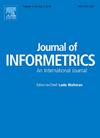衡量主题层面期刊影响力:JNIln(z)系列指标
IF 3.5
2区 管理学
Q2 COMPUTER SCIENCE, INTERDISCIPLINARY APPLICATIONS
引用次数: 0
摘要
期刊影响的准确评估对期刊的发展至关重要。现有的期刊标准化影响指标主要是在实地一级编制的。随着跨学科融合的增加和学科界限的模糊,主题的日益多样化使得领域层面的标准化指标不足以进行细粒度的期刊影响评估。为了解决这个问题,我们之前提出了期刊规范化影响(JNI),这是一个集成了主题建模和引用数据的主题级别规范化指标。但是,JNI在主题聚类、计算合理性、主题层面影响解释等方面存在局限性。本研究提出了改进的框架,并开发了JNIln(z)系列指标,采用z-score归一化的深度语义主题建模方法,采用“过滤器-分类-统一归一化”方法,确保影响测量的鲁棒性和可解释性。实证分析证实,jnn (z)指标有效地反映了期刊的总体影响和特定主题的影响。与以前的指标相比,jnn (z)指标提高了评估精度,提供了更健壮和稳定的测量,并揭示了更细微的主题级见解。希望本研究能为精细化的、基于主题的期刊评价奠定基础,使研究评价更加准确可靠。本文章由计算机程序翻译,如有差异,请以英文原文为准。
Measuring the topic-level journal impact: JNIln(z) series indicators
Accurate assessment of journal impact is essential for informing and guiding journal development. Existing journal normalized impact indicators are predominantly constructed at the field level. With increasing interdisciplinary integration and blurred disciplinary boundaries, the growing diversity of topics has rendered field-level normalized indicators insufficient for fine-grained journal impact evaluation. To address this, we previously proposed the Journal Normalized Impact (JNI), a topic-level normalized indicator that integrates topic modeling and citation data. However, JNI has limitations in topic clustering, the rationality of its calculation, and topic-level impact interpretation. This study proposes an improved framework and develops the series indicators, employing in-depth semantic topic modeling approach with z-score normalization and applying a “filter-classify-unify normalization” approach to ensure the robustness and interpretability of impact measurement. Empirical analysis confirms that the indicators effectively capture both overall and topic-specific journal impact. Compared to previous indicators, the indicators improve evaluative precision, offer more robust and stable measurements, and reveal more nuanced topic-level insights. We hope this study provides a foundation for refined, topic-based journal evaluation and contributes to more accurate and reliable research assessment.
求助全文
通过发布文献求助,成功后即可免费获取论文全文。
去求助
来源期刊

Journal of Informetrics
Social Sciences-Library and Information Sciences
CiteScore
6.40
自引率
16.20%
发文量
95
期刊介绍:
Journal of Informetrics (JOI) publishes rigorous high-quality research on quantitative aspects of information science. The main focus of the journal is on topics in bibliometrics, scientometrics, webometrics, patentometrics, altmetrics and research evaluation. Contributions studying informetric problems using methods from other quantitative fields, such as mathematics, statistics, computer science, economics and econometrics, and network science, are especially encouraged. JOI publishes both theoretical and empirical work. In general, case studies, for instance a bibliometric analysis focusing on a specific research field or a specific country, are not considered suitable for publication in JOI, unless they contain innovative methodological elements.
 求助内容:
求助内容: 应助结果提醒方式:
应助结果提醒方式:


